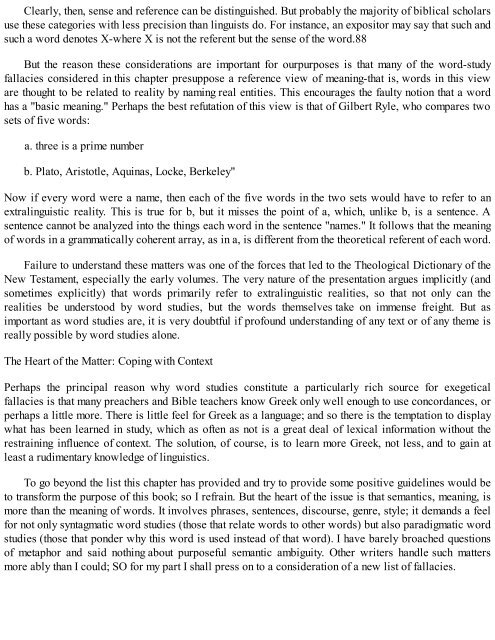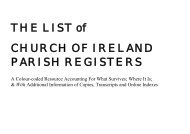Exegetical Fallacies - D. A. Carson
Exegetical Fallacies - D. A. Carson
Exegetical Fallacies - D. A. Carson
Create successful ePaper yourself
Turn your PDF publications into a flip-book with our unique Google optimized e-Paper software.
Clearly, then, sense and reference can be distinguished. But probably the majority of biblical scholars<br />
use these categories with less precision than linguists do. For instance, an expositor may say that such and<br />
such a word denotes X-where X is not the referent but the sense of the word.88<br />
But the reason these considerations are important for ourpurposes is that many of the word-study<br />
fallacies considered in this chapter presuppose a reference view of meaning-that is, words in this view<br />
are thought to be related to reality by naming real entities. This encourages the faulty notion that a word<br />
has a "basic meaning." Perhaps the best refutation of this view is that of Gilbert Ryle, who compares two<br />
sets of five words:<br />
a. three is a prime number<br />
b. Plato, Aristotle, Aquinas, Locke, Berkeley"<br />
Now if every word were a name, then each of the five words in the two sets would have to refer to an<br />
extralinguistic reality. This is true for b, but it misses the point of a, which, unlike b, is a sentence. A<br />
sentence cannot be analyzed into the things each word in the sentence "names." It follows that the meaning<br />
of words in a grammatically coherent array, as in a, is different from the theoretical referent of each word.<br />
Failure to understand these matters was one of the forces that led to the Theological Dictionary of the<br />
New Testament, especially the early volumes. The very nature of the presentation argues implicitly (and<br />
sometimes explicitly) that words primarily refer to extralinguistic realities, so that not only can the<br />
realities be understood by word studies, but the words themselves take on immense freight. But as<br />
important as word studies are, it is very doubtful if profound understanding of any text or of any theme is<br />
really possible by word studies alone.<br />
The Heart of the Matter: Coping with Context<br />
Perhaps the principal reason why word studies constitute a particularly rich source for exegetical<br />
fallacies is that many preachers and Bible teachers know Greek only well enough to use concordances, or<br />
perhaps a little more. There is little feel for Greek as a language; and so there is the temptation to display<br />
what has been learned in study, which as often as not is a great deal of lexical information without the<br />
restraining influence of context. The solution, of course, is to learn more Greek, not less, and to gain at<br />
least a rudimentary knowledge of linguistics.<br />
To go beyond the list this chapter has provided and try to provide some positive guidelines would be<br />
to transform the purpose of this book; so I refrain. But the heart of the issue is that semantics, meaning, is<br />
more than the meaning of words. It involves phrases, sentences, discourse, genre, style; it demands a feel<br />
for not only syntagmatic word studies (those that relate words to other words) but also paradigmatic word<br />
studies (those that ponder why this word is used instead of that word). I have barely broached questions<br />
of metaphor and said nothing about purposeful semantic ambiguity. Other writers handle such matters<br />
more ably than I could; SO for my part I shall press on to a consideration of a new list of fallacies.



